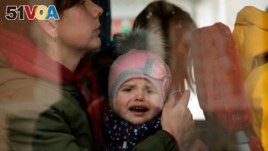13 March 2022
After bombs started falling in her hometown of Kharkiv, Annamaria Maslovska left her friends, her toys and her life in Ukraine.
She began on a trip with her mother toward safety. The mother and daughter crossed the Hungarian border by train along with hundreds of other Ukrainian refugees. The 10-year-old girl said she had begun to worry about her friends in Kharkiv after phone messages she sent to them went unanswered.
"I really miss them because I can't contact them, they just read my messages and that's all. I really worry, because I don't know where they are," Annamaria said in English at the train station in the border town of Zahony.

A Ukrainian child reacts as he boards a bus after arriving at Hendaye train station, southwestern France, Wednesday, March 9, 2022. (AP Photo/Bob Edme)
Annamaria was raised alone by her mother. She is one of more than 1 million children who have fled Ukraine in the weeks since Russia first invaded the country. UNICEF spokesperson James Elder called it "a dark historical first."
The estimates mean that children represent half of the more than 2 million people who have fled the war. The U.N. refugee agency calls it the fastest-growing refugee crisis in Europe since World War II. There have been cases of children having to make the trip out of Ukraine alone.
Most of those fleeing the war have entered countries on Ukraine's western border, including Hungary, Poland, Slovakia, Romania and Moldova. The majority have gone into Poland. About 1.33 million refugees have crossed into that country, the Polish Border Guard agency says.
Moldova Prime Minister Natalia Gavrilița said on the American channel Cable News Network (CNN) that one in every eight children in her country is a refugee.
Young children may not understand that their lives have been changed. But, older ones know of their hardship. Those children risk suffering emotional trauma from the war and from their escape, experts say.
Margot is a one-year-old girl who traveled from Kyiv to the Siret border crossing in Romania. For her, the journey was like a "little adventure," said her mother, Viktoria Filonchuk. But for other older children, she suspects they understand what they are going through.
"Such little kids maybe don't understand this, but kids of about 3 or 4 years understand all the tragedy. I think it is very hard for them," Filonchuk said.
Daniel Gradinaru is a coordinator of Fight for Freedom, a Christian nongovernmental organization at the Romanian border. He said that older children could be "marked for the rest of their lives" by the experience of unexpectedly leaving their homes and traveling for days in the cold.
Nine-year-old Valeria Varenko traveled to Hungary with her mother Julia and her little brother. Bombings had forced them to shelter in the underground area of their apartment building in the Kyiv.
The family reached a temporary refugee reception center in Barabas, Hungary. Valeria said she wanted to tell children left behind in Ukraine to be careful, and not to touch any objects in the street. "They could be bombs which can hurt them very much," Valeria said.
Her father stayed behind to help defend Kyiv from Russian troops nearing to the city. "I would really like him to come, but unfortunately he isn't allowed," she said of her father.
Ukrainian men between the ages of 18 and 60 are currently not permitted to leave the country. That policy is aimed at keeping men available to fight against Russian forces.
Annamaria's hometown of
, Ukraine's second-largest city, has seen heavy bombardment by Russian forces. Neighborhoods in the city near the Russian border were shelled for several days before a missile strike hit a government building in the city's central Freedom Square last week. At least six people were killed in that attack.
Ukrainian President Volodymyr Zelenskyy called the attack "undisguised terror."
Although she is only 10, Annamaria already knows she wants to be an actress in the United States. She is proud that she can speak English at a high level.
"I want to be an actress in USA and English is a very popular language," she said. "A big percent of people in the world know it and it's very easy to speak it in other countries."
Annamaria and her mother, Viktoria, planned to travel on to Hungary's capital, Budapest. But they do know where they would go after that. Annamaria said she hoped to visit Disneyland in France.
Once the war ends, she said, she wants to go back to Kharkiv and reconnect with her friends.
"If war stops, I really want to go home because there are my friends, there are beautiful parks, supermarkets, centers, and playgrounds behind my house," she said. "Kharkiv, it's like a piece of your heart."
I'm John Russell. And I'm Jill Robbins.
Justin Spike and Renata Brito reported this story for The Associated Press. Ashley Thompson adapted it for VOA Learning English.
_____
Words in This Story
hardship –n. something that causes pain, suffering, or loss
trauma –n. a very difficult or unpleasant experience that causes someone to have mental or emotional problems usually for a long time
journey –n. an act of traveling from one place to another; a trip
tragedy –n. a very sad, unfortunate, or upsetting situation; something that causes strong feelings of sadness or regret; a tragic event
reception –adj. related to receiving or welcoming people to a place that they do not know a lot about
allow –v. to permit; to let something happen
undisguised –adj. not hidden or secret










